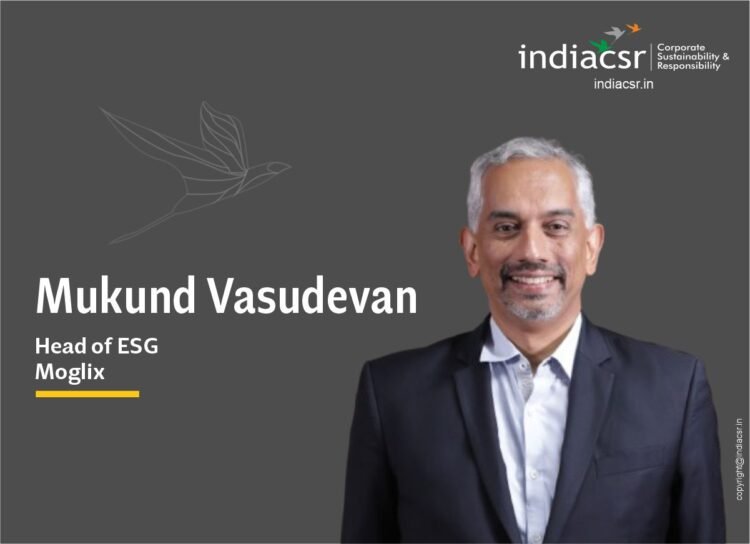ESG: This interview aims to shed light on the innovative strategies, tools, and the overall impact these initiatives have on the supply chain industry.
In this insightful discussion with Mukund Vasudevan, Head of ESG at Moglix, India CSR delve into the company’s progressive methods of incorporating Environmental, Social, and Governance (ESG) criteria into their supplier evaluation processes. As a significant player in the procurement arena for manufacturing firms, Moglix stands out for its commitment to integrating ESG considerations within its expansive network of suppliers, especially SMEs.
Excerpts of an interview:
India CSR: How Moglix is integrating ESG criteria into its supplier evaluation process. Could you share some insights into your strategy and the tools that have aided this effort?
Mukund Vasudevan: Our journey to incorporate ESG (Environmental, Social, and Governance) criteria into the supplier evaluation process began a few years ago. At Moglix, our focus is on optimizing procurement for manufacturing firms across India and worldwide, primarily through indirect procurement. This encompasses a wide range of supplies used in factories beyond raw materials.
We recognized that this segment, often overlooked in terms of ESG considerations, presented significant challenges for our manufacturing partners. The majority of our vendors, over 80% of them, are SMEs, accounting for a relatively small portion, around 5-10%, of their procurement. Ensuring compliance, ethical practices, quality, and standards across this diverse group posed a challenge.
To tackle these challenges, we adopted a three-pronged strategy. Our first step was centered on governance. We positioned ourselves as aggregators for manufacturing companies, streamlining their indirect spend by managing thousands of vendors. This allowed us to ensure vendor compliance, proper documentation, and adherence to financial and ethical standards, creating a solid foundation.
The second element addressed the social aspect. As our company expanded, we on boarded more SMEs that met our stringent compliance criteria. We encouraged ethical business practices among these suppliers, nurturing a culture of quality, cost-effectiveness, timely delivery, and ethical conduct.
Finally, we incorporated the environmental element. Suppliers were encouraged to perform self-certification regarding their environmental impact, focusing on energy conservation, water usage reduction, and carbon footprint reduction. While initial certification was self-assessed, we also assisted key suppliers in undergoing external audits, thereby completing the triad of ESG considerations within our supplier ecosystem.
India CSR: Could you elaborate further on the importance of ESG compliance for suppliers, and how this initiative benefits them?
Mukund Vasudevan: ESG compliance holds immense significance for suppliers, particularly in today’s business landscape. While major corporations in India prioritize ESG practices, this focus extends beyond their internal operations. About 50% of the ESG challenge lies within their supplier network.
This awareness has prompted manufacturing giants to acknowledge their suppliers’ role in the overall ESG equation. They’re actively engaging suppliers in conversations about obtaining ESG certifications. However, many SMEs find it challenging to meet these requirements on their own. This is where we come in, enabling SMEs to achieve a certain level of ESG certification and facilitating collaboration with these manufacturing leaders.
The importance of this initiative is multi-faceted. Enhanced ESG compliance opens doors to global funding opportunities as ESG factors gain prominence in investment decisions. Additionally, businesses are driven by a desire to make positive social and environmental contributions. Achieving these goals requires collective effort throughout the supply chain. For instance, a company aiming to reduce its ESG footprint can inadvertently increase it through environmentally non-compliant transportation. Thus, collaboration with suppliers becomes essential to achieving ESG objectives, creating a positive impact on the environment and society.
India CSR: It’s evident that your efforts are driving positive change. Could you provide more insight into the training, awareness programs, and rewards you offer to your suppliers as part of this initiative?
Mukund Vasudevan: While we don’t provide direct cash incentives, we’ve adopted a strategic approach to incentivize suppliers aligned with ESG compliance. We actively channel more business towards suppliers demonstrating strong ESG practices. This reflects our commitment to supporting responsible and sustainable practices.
For example, when customers seek products from similar quality and cost-effectiveness vendors, those with higher ESG ratings gain an advantage. We prioritize directing business to these suppliers, effectively recognizing and rewarding their commitment to ESG principles. This approach serves as an incentive and aligns with our dedication to sustainability and responsible business practices.
India CSR: Can you share more about the criteria you follow and the measures you consider when monitoring suppliers’ ESG performances?
Mukund Vasudevan: Certainly, we have a comprehensive checklist encompassing various ESG criteria. While I can’t share the exact details as its proprietary, this checklist forms the foundation of our evaluation process. Suppliers initially fill out the checklist and submit it to us. Strategic suppliers undergo thorough assessments based on these criteria. We often conduct audits to validate the information provided.
Our framework aligns closely with globally recognized eco-asset rating assessment approaches. However, we’ve tailored it to suit our e-commerce business model. This customization acknowledges our unique needs as we don’t operate as a manufacturing entity.
India CSR: How do you prioritize monitoring suppliers’ ESG performances?
Mukund Vasudevan: My focus has been centered on fundamental operational aspects. Quality, cost-effectiveness, and reliable delivery are prerequisites for any manufacturing company. Ensuring high-quality products at the right cost and on time is the cornerstone of manufacturing. Quality, in particular, is vital, as subpar materials are unacceptable. We emphasize the quality of delivered goods, addressing about 70% of quality, cost, and delivery requisites.
Beginning with governance, accurate GST filings and audited financials hold considerable importance. This is pivotal, especially for financing opportunities we offer to suppliers. It’s not only a testament to their financial stability but also grants access to financing avenues, benefiting SMEs. We also consider the social dimension, examining labor practices, employee welfare, and community engagement. Our commitment extends to encouraging suppliers to align with our stringent ESG standards.
India CSR: How do you envision the future of ESG integration and transparency in the supply chain industry?
Mukund Vasudevan: The road ahead is promising, particularly in India. Setting goals is the first step toward achieving ESG milestones. Many large companies have set ambitious goals, but medium-sized and smaller companies often lack a vision for the future. More work needs to be done in this regard.
Collaboration is key, with both large and smaller suppliers working together to develop environmentally friendly products. Our efforts to digitize processes, reduce paper usage, and enhance governance will play a role in this journey. In line with the government’s Net Zero announcement, there’s much to be done in areas like transitioning to EV trucks, embracing solar energy in warehouses, and advancing digital processes. These steps, combined with incremental progress, will lead us toward a more sustainable and transparent supply chain industry.
(CopyRight@India CSR)
The opinions shared in this article are solely those of the author and do not reflect the views of this publishing house.






















